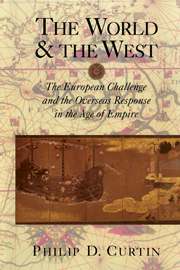Book contents
- Frontmatter
- Contents
- Preface
- Part One Conquest
- Part Two Culture Change and Imperial Rule
- Part Three Conversion
- Part Four Independence and the Liquidation of Empires
- 11 Non-European Resistance and the European Withdrawal
- 12 Personal and Utopian Responses
- 13 The Search for Viable Independence: Indonesia
- 14 Paths to Viable Independence: Ghana
- Afterword
- Index
11 - Non-European Resistance and the European Withdrawal
Published online by Cambridge University Press: 05 June 2012
- Frontmatter
- Contents
- Preface
- Part One Conquest
- Part Two Culture Change and Imperial Rule
- Part Three Conversion
- Part Four Independence and the Liquidation of Empires
- 11 Non-European Resistance and the European Withdrawal
- 12 Personal and Utopian Responses
- 13 The Search for Viable Independence: Indonesia
- 14 Paths to Viable Independence: Ghana
- Afterword
- Index
Summary
The word nationalism is used to describe political opposition to foreign rule, but that term is as ambiguous as imperialism itself. In Europe, however, nationalism has a slightly different meaning as the sentiment of solidarity on the part of those who consider that they share a common cultural heritage, often including the goal of incorporating their nation in a sovereign state. At times the state came first and created a nation within its borders; at others, the group claiming to be a nation had had only an ephemeral political organization in the past. People's belief that they share a common culture is often subjective and transient, and the political goals that follow from it can be extremely diverse. Britain and North America in recent decades share far more elements of common culture than Italians or the Germans shared in the mid-1800s, yet German and Italian nationalism led to the formation of new national states, while sentiment in favor of the political reunification of Britain, Canada, and the United States is negligible. Clearly, something other than common history and culture are necessary to create a consequential nationalist movement.
In other circumstances, feelings of common culture, religion, language, and ethnic identity are a major cause of violence among neighbors. Nor are the causes of ethnic violence quite the same as those of political nationalism. Recent events in Northern Ireland and the former Yugoslavia bear this out, and the phenomenon is not necessarily limited to Europe – witness the recent history of Israel and Palestine, Somalia and Sudan.
- Type
- Chapter
- Information
- The World and the WestThe European Challenge and the Overseas Response in the Age of Empire, pp. 195 - 212Publisher: Cambridge University PressPrint publication year: 2000



